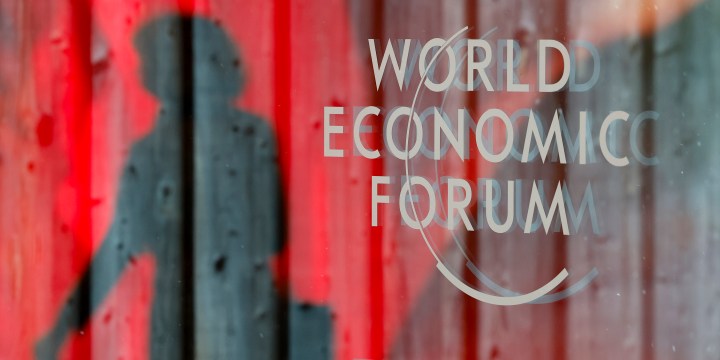
The World Economic Forum logo on a window in the Congress Centre on the closing day of the World Economic Forum (WEF) in Davos, Switzerland, on 19 January 2024. (Photo: Stefan Wermuth / Bloomberg via Getty Images)
By Tim Cohen
Follow
21 Jan 2024
Fewer African heads of state are at the World Economic Forum (WEF) in Davos, perhaps because of global issues such as armed conflict. While Finance Minister Enoch Godongwana is not concerned, other African delegates say the continent should up its game.
The story of Africa at Davos this year is about who didn’t come, the website Semafor pointed out, and more specifically, the presidents who didn’t come.
South Africa’s President Cyril Ramaphosa was never coming because elections are around the corner, but Nigeria’s President Bola Tinubu and Kenya’s President William Ruto pulled out at the last minute. There were big programmes associated with both presidents, and one of the reasons Ramaphosa didn’t make it was precisely to make some space for his continental colleagues.
What kept the other two presidents away, it turned out, were quasi-electoral concerns: Nigeria is facing huge inflationary issues after the decision to float its currency, the naira. Food inflation alone was 33.9%, Semafor notes and, in this context, luxuriating in expensive venues in the Swiss Alps is probably a bad idea politically.
In Kenya, food protests are taking place, and there is also the dimension of rising taxes and a sluggish economy; GDP growth in Kenya is going to be only 5% this year. Imagine.
Two African presidents did attend: Ghana’s President Nana Akufo-Addo and Rwanda’s President Paul Kagame. Unlike Ramaphosa, neither has to worry about elections: Addo ends his last term in December and Kagame is going to the polls this year, but elections are not typically something he should lose his sleep over. Let’s just say there is a good chance he will buy a significant majority.
There has been something of a debate in African delegations whether this is a sign of Africa sliding off the global agenda, or if this is an understandable consequence of a world that has other things on its mind.
In an interview, South Africa’s delegation leader and finance minister, Enoch Godongwana, said he didn’t think it was a major concern: heads of state might have been absent this year, but African delegations as a whole were large and senior.
However, other delegates were more concerned, with one pointing out privately that there has always been a panel made up solely of African presidents.
What about African issues? The major continental selling point over the past years has been the African Continental Free Trade Area (AfCFTA). Selling this idea to Davos has been a real winner, and extremely popular with Davos’s business delegates. The role the idea of the AfCFTA has played in reversing Afro-pessimism has been noteworthy, particularly in a global context in which free trade is under attack.
The problem is that you can only make a conceptual point so many times before people start asking when something concrete is going to happen. Proponents of the idea point out that the issues involved are enormously complex, and it’s only been three years since work on the actual nitty-gritty of the agreement got under way.
Some African countries are understandably worried about whether the agreement will harm their existing and not particularly well-established industrial sectors, which is the same political fear that has held back larger World Trade Organization free trade deals for decades.
What has happened is that there has been a big jump in African countries that have joined the “guided trade initiative”, the AfCFTA’s roll-out trail system. AfCFTA secretary-general Wamkele Mene announced on a panel at Davos that this number had increased from seven to 31, which means almost three-quarters of the 47 countries that have formally signed up are now participating in trials, Bloomberg reported.
These trials in 2023 included processed agricultural products, manufactured goods and services, Mene said.
The AfCFTA also published a study this year on the effect the agreement might have on four priority sectors: automotive, agriculture and agro-processing, pharmaceuticals, and transport and logistics. So there has been lots of behind-the-scenes work, and the prize is enormous: the AfCFTA has a potential market of 1.3 billion people with a combined GDP of $3.4-trillion. It could be the world’s biggest free trade zone by area when it becomes fully operational by 2030.
There is also a view that Africa’s lower profile this year is understandable, given the sheer immediacy and thump of the other big conference issues: regional conflict, artificial intelligence and the global cost-of-living crisis.
One idea to remedy the problem would be to bring back the regional WEF conference, and some delegates expressed support for the idea. Godongwana said he had not heard there were plans to do so and, anyway, the WEF itself has in the past struggled to find a venue that fits its multiple criteria.
Previously, it was held in Cape Town, which delegates love but the South African government probably does not. It has been held in Rwanda, but that too involves some tricky trade-offs. Both Kenya and Nigeria would be natural choices, but the Africa WEF has never been held in either country, and consequently there is some doubt about logistical issues.
Whatever the case, some African delegates are determined the continent should up its game: Davos is a unique showcase for African countries to present their case to international investors. It seems a pity to let it slide. DM
This story first appeared in our weekly Daily Maverick 168 newspaper, which is available countrywide for R29.
No comments:
Post a Comment